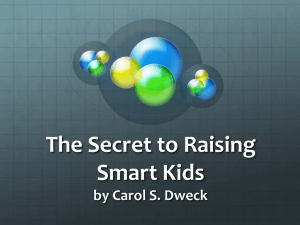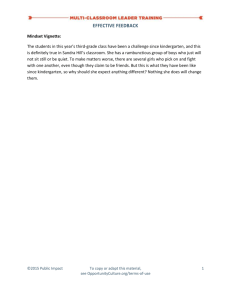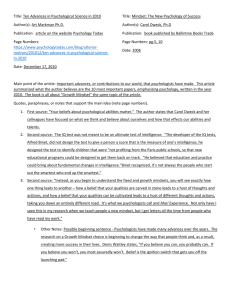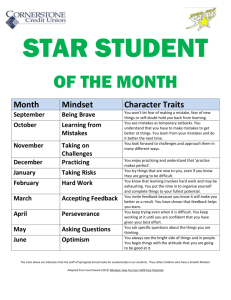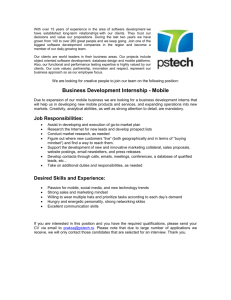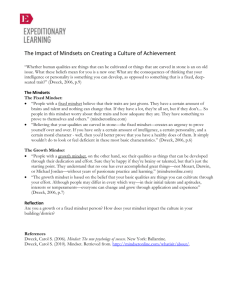College Student Success How Universities Can Impact Outcomes
advertisement
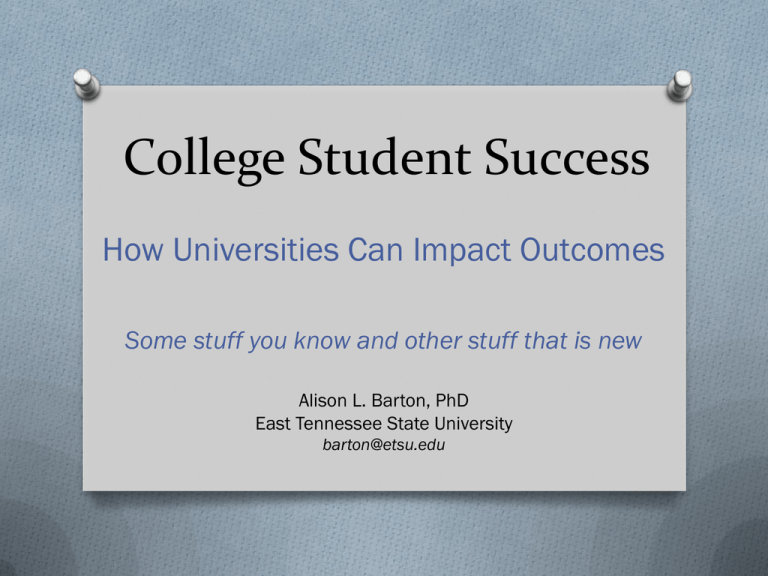
College Student Success How Universities Can Impact Outcomes Some stuff you know and other stuff that is new Alison L. Barton, PhD East Tennessee State University barton@etsu.edu What Is “College Student Success”? What Is “College Student Success”? Learning a body of knowledge well enough to go on to be effective in whatever the student does next O How to seek out information O How to self-evaluate and plan for improvement O How to work with others O How to manage time O How to balance life priorities Teams of 3-5 Focus Fox Stop talking. Put up Focus Fox. Teams of 3-5 O Manager O Keeps team on-task, moving along O Makes sure others are doing their jobs O Spokesperson O Asks questions of speaker O Answers for team during whole-group discussion O Time Keeper O Makes sure team doesn’t linger too long on any one item – watches the time O Consensus-Builder O Ensures everyone gets heard O Makes sure answer represents consensus of team O Recorder O Legibly writes down main points from team discussion Psychological Model of College Student Retention1 Entry Characteristics Environmental Interactions • Initial Attributions • Normative Beliefs • Coping Strategies • Self-Efficacy • Past Behavior • Bureaucratic • Academic • Social • External 1 Bean & Eaton (2001-2002) Parenting O Permissive Parenting O Helicopter Parenting O Authoritarian Parenting O Psychological Control O Family Enmeshment Academic Entitlement (Depression, Stress) Psychological Model of College Student Retention1 Entry Characteristics Environmental Interactions • Initial Attributions • Normative Beliefs • Coping Strategies • Self-Efficacy • Past Behavior • Bureaucratic • Academic • Social • External 1 Bean & Eaton (2001-2002) Can we shape students’ Entry Characteristics? Model 2 Expectancies Outcome Expectancies Efficacy Expectancies Belief that one’s actions can lead to a desired outcome Belief in one’s personal ability and control “If I do what needs to be done, I can succeed.” “Even if I do what needs to be done, my actions won’t result in success” “I have the skill and ability to do this – or I will, once I learn.” “I don’t have what it takes, and I never will.” 8 10 min What’s the difference between Outcome and Efficacy Expectancies? Thanks to: https://wikispaces.psu.edu/display/psych484/7.+self-efficacy+and+social+cognitive+theories (Wood & Bandura, 1989) [Bandura’s Triadic Reciprocal Determinism] Can we impact students’ Expectancies? How can faculty & staff negatively impact Expectancies? View: Harry Potter & the Sorcerer’s Stone – Harry’s first day in Potions class with Professor Snape https://www.youtube.com/watch?v=brDO1mx4SUo Model 3 8 min Dweck (2006) Which Mindset is better? How can Mindset impact university Interactions? Mindset: What the research says O FM negatively impacts students’ self-esteem and GPA, compared to GM (Dweck, 1999a) O Those with a FM ignore formative feedback after failure (Mangels et al., 2006) O Mentors with a FM spend less time with mentees, compared to those with GM (Heslin et al., 2006) O Teaching about mindsets increases student performance and engagement (Aronson et al., 2002; Blackwell et al, 2007) How can we impact Mindset? View: Dr. Carol Dweck interview on Mindset https://www.youtube.com/watch?v=ICILzbB1Obg (recommend also her TED Talks!) • Explain how the brain develops • Discuss stories of perseverance • Discuss how to handle failure • Cultivate optimism • Remind about using feedback • Praise effort, not intelligence Model 4 8 min http://msue.anr.msu.edu/news/make_4-h_youth_active_participants_in_their_learning How do you define active learning? Active Learning O Active learning is a model of instruction that focuses the responsibility of learning on learners. Active learning engages students in two aspects – doing things and thinking about the things they are doing. - Wikipedia (excerpts) O Active learning is a process whereby students engage in activities, such as reading, writing, discussion, or problem solving that promote analysis, synthesis, and evaluation of class content. - Univ. of Michigan Can Bureaucratic Interactions utilize active learning? Are WE doing active learning today? POGIL Process-Oriented Guided Inquiry Learning www.pogil.org 5-E Model of Learning Information Processing Model Long Term Memory New Information Working Memory Model 5 Psychological Model of College Student Retention1 (Some More) 8 min 1 Bean & Eaton (2001-2002) Attributions Controllable Uncontrollable Internal Effort Intelligence/Talent External Environment Luck Attributions Controllable Internal Effort Intelligence/Talent External Environment Uncontrollable Luck Model 5 Psychological Model of College Student Retention1 (Some More) 8 min 1 Bean & Eaton (2001-2002) How could active learning impact Psychological Processes? Sources and Recommended Readings About Active Learning: Curriculum Development for Issues Programming—A Handbook for Extension Youth Development Professionals, (1992). ES/USDA Youth Curriculum Development Task Force, 1992. (Published by CSREES). http://www.uwyo.edu/4-h/volunteers/leader-totes/youth_development/learn-by-doing.pdf About College Student Retention: Bean, J., & Eaton, S. B. (2001-2002). The psychology underlying successful retention practices. Journal of College Student Retention, 3(1), 73-89. Demtriou, C. & Schmitz-Sciborski (2011). Integration, motivation, strengths and optimism: Retention theories past, present and future. In R. Hayes (Ed.), Proceedings of the 7th National Symposium on Student Retention, 2011, Charleston. (pp. 300-312). Norman, OK: The University of Oklahoma. About Coping: Roth, S. & Cohen, L. J. (1986). Approach, avoidance, and coping with stress. American Psychologist, 41(7), 813-819. About Efficacy: Bandura, A. (1982). Self-efficacy mechanisms in human agency. American Psychologist, 37 , 122-147. Wood, R. E., & Bandura, A. (1989). Social cognitive theory of organizational management. Academy of Management Review, 14 (3), 361-384. About the 5-E Learning Cycle & POGIL: http://www.bscs.org/sites/default/files/_legacy/BSCS_5E_Instructional_Mod el-Executive_Summary_0.pdf http://www.ecapteach.com/survival%20traiining/lesson_16/5E_lcycle.pdf http://www.pogil.org About Good Teaching (No Matter the Instructional Setting): Ambrose, S.A., Bridges, M. W., DiPietro, M., Lovett, M. C., & Norman, M. K. (2010). How Learning Works: Seven Research-Based Principles for Smart Teaching. San Francisco, CA: Jossey-Bass. Willingham, D. T. (2009). Why Don’t Students Like School? A Cognitive Scientist Answers Questions About How the Mind Works and What It Means for the Classroom. San Francisco, CA: Jossey-Bass. About Mindset: Blackwell, L. S., Trzesniewski, C. H., & Dweck, c. S. (2008). Implicit theories of intelligence predict intelligence across an adolescent transition: A longitudinal study and an intervention. Child Development, 78(1), 246-263. Centre for Confidence and Well-Being (2007-2008). Glasgow University mindset research: report. Accessed 7/31/2015 at: http://www.centreforconfidence.co.uk/flourishinglives.php?p=cGlkPTQ5OSZpZD0xNzA1 Dweck, C. S. (1999a). Self-theories – their role in motivation, personality and development. Essays in Social Psychology. Philadelphia: Psychology Press. Dweck, C. S. (1999b, Spr). Caution: Praise can be dangerous. American Educator, 23(1), 4- 9. Or go to: https://www.aft.org/sites/default/files/periodicals/PraiseSpring99.pdf for the article. Dweck, C. S. (2006). Mindset: The New Psychology of Success. New York: Random House. * Search “Dweck” and “Mindset” in Google or YouTube for multiple talks, interviews, and articles by and about Dweck’s Mindset theory. Heslin, P., Wanderwalle, D., & Latham, G. (2006). Keen to help? Managers' IPTs and their subsequent employee coaching Personnel Psychology, 59, 871–902. Mangels, J. A., Butterfield, B, Lamb, J. Good, C., & Dweck, C. S. (2006). Why do beliefs about intelligence influence learning success? A social cognitive neuroscience model. Social Cognitive and Affective Neuroscience, 1(2), 75-86.
